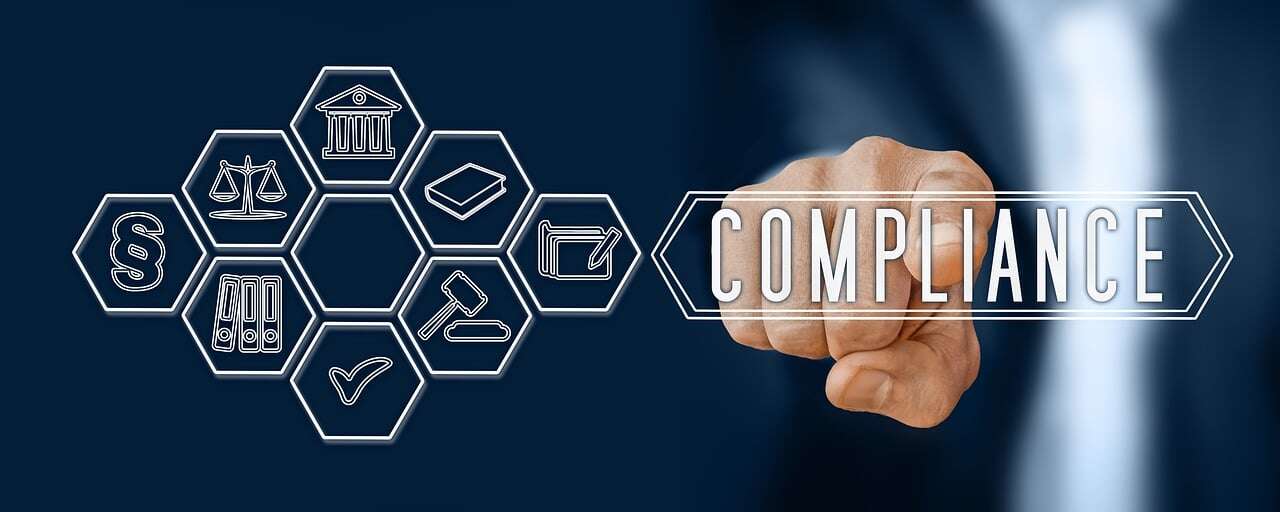
The Rise of Fintech and the Importance of Compliance
In recent years, startup Fintech firms have revolutionized the financial landscape, offering innovative solutions and fostering financial inclusion. However, alongside this disruption comes the critical responsibility of ensuring regulatory compliance. Non-compliance can lead to hefty fines, operational disruptions, and reputational damage, hindering a fintech company's ability to thrive. This comprehensive guide explores the intricacies of fintech compliance in the United States, equipping you with the knowledge to navigate this complex terrain.
Understanding the Significance of Compliance in Fintech
Fintech compliance safeguards consumers, promotes financial stability, and fosters trust within the industry. It encompasses adhering to a comprehensive framework of regulations designed to:
- Protect consumer privacy and data security
- Prevent money laundering and financial crimes
- Ensure the integrity and transparency of financial transactions
- Promote fair and ethical business practices
By prioritizing compliance, fintech firms can build trust with users, attract investors, and operate with confidence in a competitive market.
- The Regulatory Landscape: A Multifaceted Web
- Keeping Pace with Technological Advancements
- Navigating Cross-Border Regulations
- Know Your Customer (KYC) and Anti-Money Laundering (AML) Regulations
- Data Privacy and Protection Standards
- Cybersecurity Measures and PCI DSS Compliance
- Transparency and Fair Practices (CFPB Rules and UDAP/UDAAP)
- Leveraging Technology for Fintech Compliance: Innovations and Solutions
- The Future of Fintech Compliance: Embracing Change and Collaboration
- Conclusion: Building Trust and Ensuring Sustainable Growth

Ask the Experts.
The Regulatory Landscape: A Multifaceted Web
The US fintech regulatory landscape is multifaceted, with various federal and state-level agencies overseeing different aspects of financial operations. Key regulatory bodies include:
- Securities and Exchange Commission (SEC): Regulates securities offerings and investment activities.
- Consumer Financial Protection Bureau (CFPB): Enforces consumer protection laws for financial products and services.
- Federal Trade Commission (FTC): Protects consumers from unfair, deceptive, or abusive acts and practices (UDAP/UDAAP).
- Financial Crimes Enforcement Network (FinCEN): Combats money laundering and financial crimes.
Compliance obligations encompass various domains, including:
- Know Your Customer (KYC) and Anti-Money Laundering (AML) Regulations
- Data Privacy and Protection Standards (e.g., GDPR)
- Cybersecurity Measures (e.g., PCI DSS)
- Consumer Protection Regulations (e.g., CFPB Rules)

Challenges in Fintech Compliance: Keeping Pace and Crossing Borders
Keeping Pace with Technological Advancements:
The rapid pace of technological innovation in fintech can outpace existing regulations. Balancing innovation with compliance necessitates proactive strategies to adapt to emerging technologies like blockchain and artificial intelligence (AI). Regulatory bodies are constantly working to address these advancements, but fintech firms must also be prepared to implement controls and adapt their compliance programs accordingly.
Navigating Cross-Border Regulations:
Fintech firms operating globally face a complex web of international regulations. Cross-border transactions demand harmonizing operations with diverse regulatory environments, requiring careful consideration of local and international standards. Collaborating with international compliance experts and legal counsel can help navigate these complexities.
Key Compliance Areas in Fintech: A Comprehensive Approach
-
Know Your Customer (KYC) and Anti-Money Laundering (AML) Regulations:
KYC and AML regulations are foundational pillars of fintech compliance. They require firms to:
- Verify customer identities: This involves collecting and verifying customer information, such as name, address, date of birth, and government-issued identification documents. Different verification methods may be employed depending on the customer's risk profile.
- Monitor transactions for suspicious activity: Ongoing transaction monitoring allows firms to identify patterns that might indicate money laundering or other financial crimes. This may involve using automated systems and human analysts to review transactions.
- Implement robust AML programs: These programs outline the policies and procedures a firm follows to comply with AML regulations. They may include customer risk assessments, ongoing monitoring, and reporting of suspicious activity.
Example: KYC/AML Challenges for Mobile Money Platforms:
Mobile money platforms operating in emerging markets often face unique challenges in complying with KYC/AML regulations. Due to limited access to traditional identification documents, these platforms may need to adopt alternative verification methods, such as biometric identification or mobile phone network analysis. Additionally, high volume of low-value transactions can make it difficult to identify suspicious activity.
Data Privacy and Protection Standards
Given the sensitive nature of financial data, compliance with data privacy regulations is paramount. The General Data Protection Regulation (GDPR), though originating in the EU, has extraterritorial implications for fintech firms handling EU citizen data. Compliance mandates stringent requirements for data collection, processing, storage, and user consent mechanisms.
- Data Subject Rights:
The GDPR grants various rights to data subjects (individuals whose data is collected), including:- The right to access their personal data
- The right to rectification (correction of inaccurate data)
- The right to erasure (deletion of data)
- The right to restriction of processing (limitation on how data can be used)
- The right to data portability (obtaining data in a machine-readable format)
- The right to object to processing
- Data Breach Notification:
In case of a data breach, GDPR mandates that organizations notify affected data subjects within 72 hours. This notification must describe the nature of the breach, the categories of data involved, and the potential risks to individuals.
- Data Protection Officers (DPOs):
Many organizations are required to appoint a Data Protection Officer (DPO) to oversee compliance with GDPR. The DPO is responsible for raising awareness of data protection issues within the organization, advising on the impact of data processing activities, and cooperating with supervisory authorities.
Beyond GDPR: A Global Landscape of Data Privacy Regulations:
The California Consumer Privacy Act (CCPA) grants similar rights to California residents and requires businesses to disclose what personal data they collect, use, and sell. A growing number of US states are enacting their own data privacy laws, further complicating the compliance landscape for fintech firms.
Transparency and Fair Practices (CFPB Rules and UDAP/UDAAP)
Maintaining transparency and fairness is integral to building trust. Regulations like CFPB rules and UDAP/UDAAP aim to prevent deceptive or abusive practices and ensure fair treatment of customers.
- CFPB Rules: The Consumer Financial Protection Bureau (CFPB) enforces a variety of regulations designed to protect consumers in the financial services industry. These regulations cover areas such as lending, credit reporting, and debt collection.
- UDAP/UDAAP (Unfair, Deceptive, or Abusive Acts and Practices): The FTC prohibits unfair, deceptive, or abusive acts and practices in the financial marketplace. This includes practices such as misleading advertising, hidden fees, and unfair loan terms.
Examples of Deceptive Fintech Practices:
- Misrepresenting the risks of an investment product.
- Charging hidden fees.
- Failing to disclose material information.
Leveraging Technology for Fintech Compliance: Innovations and Solutions
The ever-evolving landscape of fintech demands embracing technological advancements to optimize compliance efforts. Here are some key strategies:
- Utilization of Compliance Automation Platforms:
Compliance automation platforms leverage technology to streamline processes, enhance efficiency, and improve accuracy. These platforms utilize data analytics, AI, and machine learning to:
- Automate routine compliance tasks: Such as customer onboarding, transaction monitoring, and regulatory reporting.
- Identify compliance issues in real-time: Enabling firms to proactively address potential problems.
- Generate actionable insights: Helping compliance professionals prioritize their efforts and make data-driven decisions.
By automating tasks, fintech firms can reduce compliance costs, mitigate risks, and enhance overall effectiveness.
- Adoption of Compliance-Focused Fintech Solutions:
Specialized fintech solutions can address specific compliance challenges. These solutions offer functionalities like:
- Regulatory monitoring: Keeping track of changes in regulations and industry standards.
- Risk assessment: Identifying and evaluating potential compliance risks.
- Compliance reporting: Generating reports required by regulators.
- Audit management: Streamlining the audit process.
By streamlining processes, centralizing compliance data, and facilitating demonstrations of compliance to regulators, these solutions empower firms to enhance their regulatory capabilities and achieve better compliance outcomes.
- Embracing Cloud-Based Services and API Integrations:
Cloud-based compliance platforms offer scalability, flexibility, and accessibility. This enables firms to:
- Centralize compliance data: In a secure and accessible location.
- Automate compliance processes: Regardless of location.
- Adapt to changing regulations: With ease by scaling their compliance infrastructure up or down as needed.
API integrations facilitate seamless data exchange between compliance systems and external sources, allowing for:
- Streamlined compliance operations:
Leveraging Technology for Fintech Compliance: Innovations and Solutions (continued)
- Streamlined compliance operations: By eliminating manual data entry and facilitating automated data exchange between internal systems and external sources like regulatory databases.
- Integration with existing infrastructure: Enabling compliance functionalities to seamlessly integrate with existing fintech platforms and applications.
By embracing cloud services and API integrations, fintech firms can enhance agility, efficiency, and scalability in compliance management, ultimately driving operational excellence and regulatory compliance.
The Future of Fintech Compliance: Embracing Change and Collaboration
The future of fintech compliance will be shaped by continuous technological advancements, evolving regulatory landscapes, and the growing importance of international collaboration. Here are some key trends to watch:
- The Rise of RegTech: RegTech (regulatory technology) refers to the use of technology to automate and streamline compliance processes. As regulations become more complex, RegTech solutions will play an increasingly important role in helping fintech firms stay compliant.
- Blockchain for Secure Data Storage: Blockchain technology offers a secure and tamper-proof way to store data. This could potentially revolutionize KYC/AML compliance by creating a more efficient and reliable way to verify customer identities.
- Regulatory Sandboxes and Innovation Hubs: Regulatory sandboxes are environments where fintech firms can test new products and services in a controlled setting. This can help to accelerate innovation while ensuring that new technologies comply with existing regulations.
- Cross-Border Collaboration: As the fintech industry becomes increasingly global, there will be a growing need for collaboration between regulators in different countries. This will help to ensure a level playing field for fintech firms and protect consumers around the world.
Conclusion: Building Trust and Ensuring Sustainable Growth
Navigating fintech compliance in the United States requires a strategic and proactive approach. By prioritizing compliance as a cornerstone of operations, fintech firms can:
- Uphold ethical standards
- Protect consumer interests
- Foster trust and confidence in the fintech ecosystem
Investing in compliance excellence fosters a sustainable competitive advantage and positions fintech firms for long-term success in the dynamic landscape of finance and technology. Compliance is no longer just a regulatory obligation, but a strategic imperative for ensuring trust, fostering innovation, and achieving sustainable growth within the ever-evolving fintech industry. The Cavan Group has specialized in working with clients in highly-regulated industries, including many large financial institutions with complex compliance requirements. Reach out to our team to begin a discussion on how we can help you develop strategies for meeting the challenges discussed above.
Additional Resources:
- Financial Crimes Enforcement Network (FinCEN): https://www.fincen.gov/
- Consumer Financial Protection Bureau (CFPB): https://www.consumerfinance.gov/
- Federal Trade Commission (FTC): https://www.ftc.gov/
- Securities and Exchange Commission (SEC): https://www.sec.gov/
This comprehensive guide has equipped you with the knowledge and resources to navigate the intricacies of fintech compliance in the United States. Remember, staying informed, embracing innovation, and prioritizing ethical practices are key to building a successful and sustainable fintech business in the years to come.

